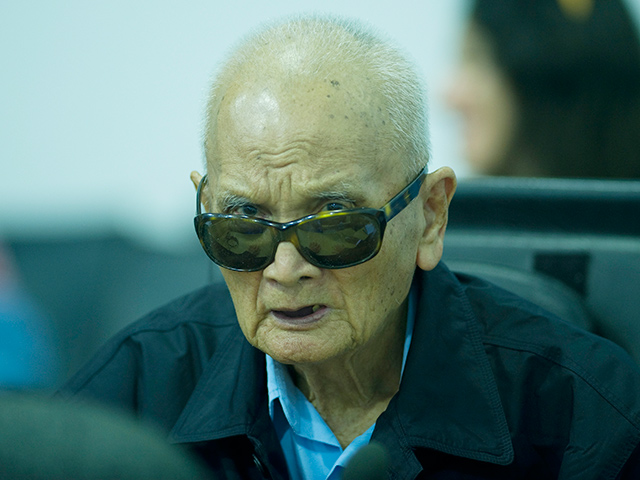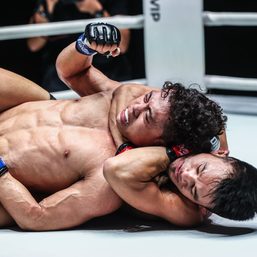SUMMARY
This is AI generated summarization, which may have errors. For context, always refer to the full article.

PHNOM PENH, Cambodia – Cambodia‘s Khmer Rouge trial entered a crucial phase Wednesday, October 16, with closing statements in the case of former regime leaders accused of masterminding one of the worst horrors of the 20th century.
More than 3 decades after the country’s “Killing Fields” era, the UN-backed court is moving closer to a verdict in the case of “Brother Number Two” Nuon Chea, 87, and ex-head of state Khieu Samphan, 82.
Their complex case has been split into a series of smaller trials, starting with the forced evacuation of the population into rural labor camps and the related charges of crimes against humanity.
Lawyer Elisabeth Simonneau-Fort, representing victims, urged the court to “visualize people walking in an atmosphere of violence and threats.”
She described people dying at the roadside, and “terrified children” and frantic parents sent to separate labour camps.
“Despite the number of mass graves… the accused continue to say they did not know,” she added, denouncing their “wall of silence.”
The defendants deny charges of war crimes, crimes against humanity and genocide.
Around 500 Cambodians, including former regime cadres, watched the hearing from the public gallery.
Nuon Chea left the courtroom after 20 minutes and was allowed to follow proceedings from a holding room. His co-defendant remained, although his eyes at times appeared to be closed.
Led by Pol Pot, who died in 1998, the communist regime wiped out up to 2 million people – nearly a quarter of the population – through starvation, overwork and execution in the late 1970s.
The trial, which began hearing evidence in late 2011, is widely seen as a landmark in the nation’s quest for justice.
‘Survivors still face nightmares’
The evacuation of Phnom Penh in April 1975 reduced the city to a ghost town in a matter of days. It was one of the largest forced migrations in modern history.
More than two million people were expelled from the capital at gunpoint and made to march to rural labor camps as part of the Khmer Rouge plan to forge an agrarian utopia.
No mercy was shown to those too weak to make the journey. Patients walked carrying their IV drips and pregnant women gave birth at the roadside.
Lawyers for the “civil parties”, which represent thousands of plaintiffs, alleged the defendants had intimate knowledge of the Khmer Rouge’s “elimination” policy.
Many of those deemed to be regime enemies still “face nightmares… and constant mental suffering after witnessing torture and killing, including of their own relatives”, lawyer Sam Sokong told the court.
The statements are scheduled to be completed by the end of the month, with a verdict expected in the first half of next year.
Other allegations, including genocide and war crimes, are due to be heard in later hearings although no date has yet been set.
Observers and survivors have long raised fears about the speed of proceedings and the advanced age of the accused.
Another defendant, former foreign minister Ieng Sary died aged 87 in March this year, while the case against his wife Ieng Thirith – also an ex-minister – was suspended after the court ruled dementia left her unfit to stand trial.
The court has been hit by delays caused by money shortages, staff walkouts, alleged political interference as well as the poor health of the accused.
In its historic first trial, the court in 2010 sentenced former prison chief Kaing Guek Eav to 30 years in prison – later increased to life on appeal – for overseeing the deaths of 15,000 people.
The court is investigating two possible new cases – strongly opposed by the government – against several lower-ranking cadres, although there are doubts about whether they will make trial.
Attending court, Kuy Pel, a 62-year-old farmer who lost several close relatives to starvation during the regime, expressed hope the trial will bring justice – and reconciliation.
“If we think about revenge, Cambodia will fall apart,” he warned. – Rappler.com
Add a comment
How does this make you feel?





There are no comments yet. Add your comment to start the conversation.